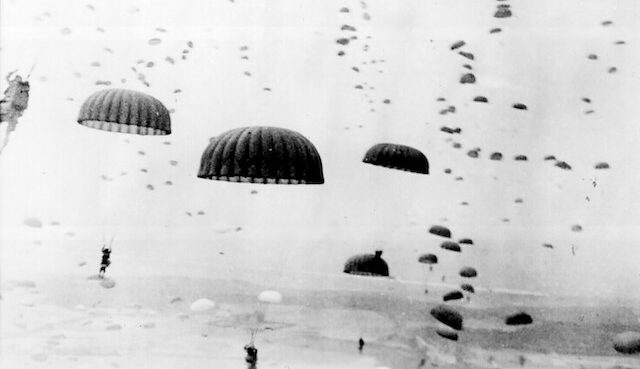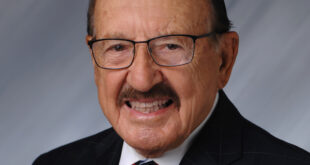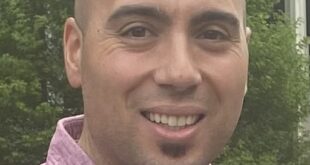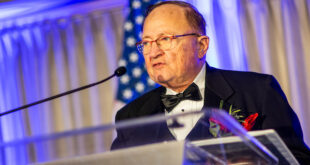Only 19 years old when World War II took his life, Alexander Delulio Jr. lives on in the hearts and minds of his extended family.
On Sept. 17, 1944, Pfc. Alexander Delulio Jr. parachuted into Zon, Holland, with the 502nd Parachute Infantry Regiment, 101st Airborne Division, as part of Operation Market-Garden.
Two days later, Pfc. Delulio gave his life in the defense of freedom while serving along the Eindhoven-Arnhem Highway near the town of Best. He was manning a slit trench when a German mortar struck. His young body remained in the trench until it could be buried during a simple service officiated by a Catholic chaplain.
More than four years later, his remains were returned to his family for a funeral Mass at Santa Maria Addolorata in Chicago, followed by interment with full military honors at Mt. Carmel Cemetery in Hillside. The American flag that draped his casket was handed to his father, Alexander Sr., who was still shattered by grief. The young man’s mother was spared that sorrow, having passed away 16 months before her son’s untimely demise.
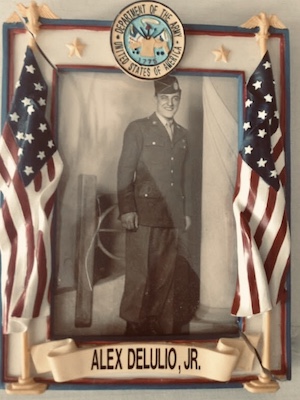 Pfc. Alexander Delulio Jr. was my cousin, and an image frozen in time set me on a personal quest to explore this cataclysmic event. Sent to me by Alex’s niece, Antoinette Delulio Calarco, the photo depicts a small wall shrine containing a snapshot of Alex in full military uniform. Beneath it was another photo of the Purple Heart he earned for his sacrifice.
Pfc. Alexander Delulio Jr. was my cousin, and an image frozen in time set me on a personal quest to explore this cataclysmic event. Sent to me by Alex’s niece, Antoinette Delulio Calarco, the photo depicts a small wall shrine containing a snapshot of Alex in full military uniform. Beneath it was another photo of the Purple Heart he earned for his sacrifice.
That heart-shaped medal with a bust in profile of General George Washington is bestowed upon soldiers who are either wounded or killed in combat. Alexander’s father was at the door of their home when it arrived in December of 1944. The dreaded knock was his alone to hear. With regrets from the military attaché, he was handed the black case in which the medal had been reverently placed.
The medal was accompanied by a letter from President Franklin D. Roosevelt, in which was written, “In grateful memory of PFC Alex Delulio Jr … who died in the service of his country in the European area, September 19, 1944. He stands in an unbroken line of patriots who dared to die that freedom might live and grow and increase its blessings. Freedom lives and through it he lives in a way that humbles the understanding of most men.”
Grief comes in waves. Just days before, Alex’s father received a letter officially informing him of his son’s death.
“Your son was a man of the finest character and was greatly liked and respected by all the officers and men of his company,” Cpt. Rudolph M. Jones wrote, “and his death to me represents not only the loss of a fine soldier, but also the loss of a personal friend.”
For Alex, there would be no more morning suns rising to spread a golden-orange light into the dawn sky. For his family, only memories remained, memories accompanied by deep sorrow.
Alexander and Florence Delulio had 19 scant years to watch their son Alex grow up. He attended eight years at Cameron and Otis elementary schools in Chicago and four years at Tuley High School. Seven months after he graduated, on Jan. 20, 1943, he joined the United States Army, trading civilian clothes for military attire. His three brothers had already joined the war effort, Leo and Joseph in the Army and Henry in the Navy.
Six months later, in the predawn hours before a fighting force of 156,000 stormed the beaches at Normandy, Alex parachuted in behind enemy lines to launch the Allied assault on the Nazis. It was June 6, 1944: D-Day. On that morning, he went from teenager straight to manhood.
His regiment pushed through Europe to Flanders, Belgium, where red poppies now grow between white crosses, row upon row, marking the final resting places of the fallen.
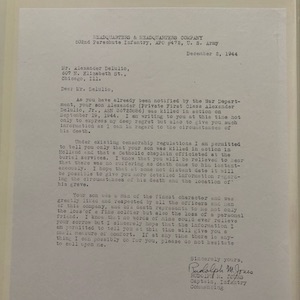 Life became increasingly fragile for Alex. After a brief rest in England, he and his division parachuted into Drop Zone “B” in a field outside Zon, Holland. They were tasked with securing bridges along Highway 69, or as the 101st Airborne dubbed it, Hell’s Highway. Their objective was to hold a stretch of 15 miles to the main bridge at Arnhem, Holland, which was under German control.
Life became increasingly fragile for Alex. After a brief rest in England, he and his division parachuted into Drop Zone “B” in a field outside Zon, Holland. They were tasked with securing bridges along Highway 69, or as the 101st Airborne dubbed it, Hell’s Highway. Their objective was to hold a stretch of 15 miles to the main bridge at Arnhem, Holland, which was under German control.
From that bridge, they would enter Germany as part of Operation Market-Garden under Major General Maxwell Taylor. British tanks were to push along the highway, cross the Rhine at Arnhem and attack the Nazis’ wartime factories. Unfortunately, Alex did not live to see that pivotal assault.
The morning fog on Sept. 19 was so thick, the eye could scarcely see the hand. The afternoon was rainy and cold, and land-to-air communications were filled with constant interruptions. General Taylor had sent a squadron of tanks to assist the beleaguered troops of the 502nd Infantry Regiment, but at approximately 1730 hours, “All hell broke loose, with the Germans attacking from two, almost three sides … pressing closer,” Pfc. Richard Ladd recorded. “A few yards from me, a slit trench, containing the regimental message center, received a direct mortar round, killing Pvt. Alex Delulio.”
Market-Garden’s objective to cross the Rhine and take Arnhem wasn’t achieved until June 1945. The mission was considered one of the major strategic failures of World War II. For the military, Alex’s death passed quickly into history, but his memory lives on where it matters most.
Hearts pierced, to whom could his family turn in this, their adopted country, during their time of loss and sorrow? It had to be family, that wellspring of strength during challenging times, the tie that binds us from generation to generation. “He was a good man who loved his family and friends,” said my cousin Antoinette.
It has been said that “Italians keep their dead with them.” For the Delulio family, that Purple Heart is a relic by which we keep the faith. Freedom is a truth that becomes real only through sacrifice. The death of Alexander Delulio Jr. lends truth to our freedoms, and the medal he courageously earned is an enduring testament to that truth. It is an honor to salute him: a remembered son, uncle, and cousin on this and every Veterans Day.
The above appears in the November 2022 issue of the print version of Fra Noi. Our gorgeous, monthly magazine contains a veritable feast of news and views, profiles and features, entertainment and culture. To subscribe, click here.
 Fra Noi Embrace Your Inner Italian
Fra Noi Embrace Your Inner Italian


